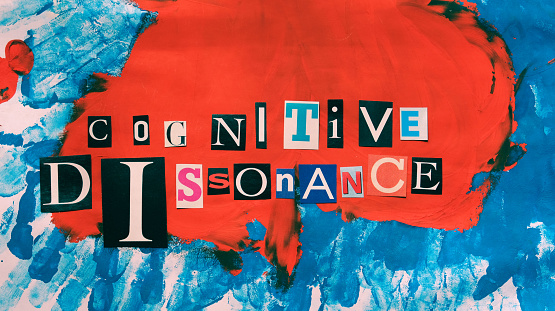What happens when what you think does not agree with what you also think?
Whether you are aware of it or not, it happens all the time! That’s the phenomenon sophisticatedly known in psychology as cognitive dissonance. Let’s take an example we knew in our childhood. Haven’t we all heard of the story of the fox and the sour grapes? In the story the fox has two conflicting thoughts: -“the grapes are sweet’. “I cannot have them.”
The fox’s resolution of the conflict is inducing the belief “the grapes are sour”. What the fox technically does is resolves its state of cognitive dissonance because it is too difficult to accept the two conflicting thoughts.
Much as we laugh and scorn at this silly fox, we do similar things all the time. Let’s take some common examples:
Two conflicting thoughts:
- “ I don’t feel like working hard”
- “ I am getting paid for working”
Resolution: “The pay is too poor to put in effort”
Two conflicting thoughts:
- “I like smoking and do not want to give it up”
- “I know smoking is terrible for my health”
Resolution: “I smoke because I am very stressed”
( If you smoke, you would probably stop reading the article here in order to decrease your cognitive dissonance, so “Goodbye”, but come back again, we do not only write about how bad smoking is.)
For the rest, who continue to read…aren’t the above examples common enough? Can we not identify with these? And yet we resolve our conflicts in such a fashion repeatedly.
Why do we do it?
The answer lies in the theory of Cognitive dissonance. This theory was proposed by Leon Festinger in 1950s. According to this theory cognitive dissonance is the uncomfortable feeling we have when we hold two conflicting ideas at the same time.
The dissonance or the uneasiness increases when the thoughts are too contradictory or when they are too important to us or when we find it difficult to explain them away. Dissonance can be most powerful when it is about us-our self-image. When we believe we are good but do something bad for instance, which we cannot explain, the discomfort is intense.
What then do we do at such a time? One or more of the three things mentioned below:
-We change our belief, we adjust it to fit it both the thoughts- as in the case of grapes are sour.
-We add new cognitions or new beliefs- like in the case of “I smoke because I am stressed.”
-We change the action- Like the person who smokes and does not read articles that emphasize it is not good for him.

Begin Your Practice Of Self Awareness & Well-Being
With Our Free E-Book ‘First Few Steps To Mindfulness’
Dealing with Dissonance: 3 tips for you from me
In my practice I come across a lot of people perpetually trying to let themselves off the handle and tackling cognitive dissonance in the above ways. Fair enough! One needs a breather at times and needs to just live in peace momentarily. However I have some suggestions based on my work as a therapist:
1.You can postpone addressing a conflict for a definite period of time, if you are feeling overwhelmed now. For instance one could say “these two thoughts together are painful to me and I am feeling overwhelmed now, I will think about them next Monday. I do not need to arrive at a judgment today”.
2. Accepting there need not be black and whites only…grays are common. For instance telling yourself “ I am largely an honest person, but sometimes I lie because I am scared to face a confrontation” instead of saying “ I am always truthful, and this lie is too small to be considered a lie.”
3. When you have honestly accepted some conflicting part of yourself, maybe then it is time to struggle with working against the behaviour you have been trying to justify. For instance instead of saying “I am not a negative person, but anyone would complain if their spouse nags them”, maybe try saying “ I do occasionally get negative when my spouse nags me, Hmm now let’s see what I can do about that”.
The above tips are in the ascending order of difficulty and perhaps you will have to work through them slowly when you are ready for each step. Dissolving dissonance by temptingly opting for the sour grapes idea, is definitely easier (which is why we do it) but from what I have learnt, definitely not fulfilling. It provides temporary cures but stops you from becoming a more integrated and complete version of yourself.
I shall write more about integration another time.
A Simple Exercise to Work with Dissonance Now
Take 2 minutes and think of a couple of conflicting thoughts that have bothered you or have been bothering you. Tell them aloud as it is- Exactly how you think of them, without judging them. Now tell yourself this is how it is. According to your current level of discomfort follow either of the above three tips.
If you do this now, you will be a miniscule shade happier for the rest of your life- It’s a promise…
Please share your experiences in the comments section of this article in the website by clicking here. A lot of people stand to gain from the experiences of a few.
For those of you interested in experiments (I am a huge fan of experiments in Social Psychology) a very interesting and classic experiment in cognitive dissonance is well documented here: How and Why We Lie to Ourselves: Cognitive Dissonance
about the author
Sadia Saeed

share this blog!
read similar blogs
Managing Difficult Thoughts Mindfully
Our mind is a powerhouse; from helping us make new...
Read MoreManage Hypertension with Mindfulness
On World Hypertension day, here is our sharing on how...
Read MoreBenefits Of Mindfulness
The Many Benefits Of Mindfulness Benefits Of Mindfulness Mindfulness helps you...
Read MoreCognitive Distortions: Reeling You In
“There is nothing either good or bad but thinking makes...
Read More





Excellent article and easy to understand explanation. How do I go about getting permission to post part of the article in my upcoming newsletter? Giving proper credit to you the author and link to the site would not be a problem.
I just wanted to comment and say that I really enjoyed reading your blog post here. It was very informative and I also digg the way you write! Keep it up and I’ll be back to read more in the future
Dear Sadia,
I was always afraid of psychology till I started to read your blog – I commend you on making complex theories simple for lay persons like me. I struggle with my temper tantrums with my parents and rationalize it by saying – I am under stress – my parents also add to this by saying – o our poor baby is stressed and who will she take it out on but us??? In my heart I feel TERRIBLE as I love them and I stay with the guilt but fall again and again and yet again. Your article is really helpful and I will try and put all your tips into practice and I really really wish to improve. God bless you!